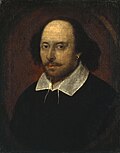Talk:To Be or Not to Be (1942 film)
| This article is rated C-class on Wikipedia's content assessment scale. It is of interest to the following WikiProjects: | |||||||||||||||||||||||||||||||||||||||||||||||||||||||||||||||
| |||||||||||||||||||||||||||||||||||||||||||||||||||||||||||||||
Stage version
[edit]Once the stage version opens on Broadway, it will need its own article. -- Ssilvers (talk) 21:57, 2 September 2008 (UTC)
Broadway play
[edit]There should be a separate article about the upcoming Broadway production, perhaps called To Be or Not to Be (play). This article should be about the 1942 film. --rogerd (talk) 21:59, 2 September 2008 (UTC)
New Plot
[edit]My intervention was aimed at making the plot shorter and easier to consult - thus to let any reader understand what the movie is about with a quick read. The new version seems to me too detailed. Encyclopedia entries about movies usually do not reach this level of detail. — Preceding unsigned comment added by Sostene (talk • contribs) 15:55, 16 February 2014 (UTC)
- You went too far. I've trimmed it down a bit. BMK (talk) 00:24, 17 February 2014 (UTC)
Only implicitly Jewish?
[edit]Greenberg, who is implicitly Jewish
Just saying: I think that is a rather, shall I say, pedantic, use of "implicit". It is quite true that the words "Jew" and "Judaism" are not said in the film, but how much more explicit than
- Greenberg: What you are I would not eat.
- The Actor who later plays the general: How dare you call me a ham?!
can you get?--2001:A61:260C:C01:74B1:7729:6255:BA1A (talk) 00:06, 16 July 2018 (UTC)
Carole Lombard's Death
[edit]How come there is no mention that the lead actress Carole Lombard died after production was finished but before the movie premiered? I think it bears mentioning, especially as she's a great actress (don't take my words for it, but that's what critics have said about her acting skills) 196.70.253.175 (talk) 15:22, 27 February 2024 (UTC)
Claims for Lubitch and Rózsa
[edit]In edit of 18:34, 16 March 2025, the claims regarding the involvement of Lubitch and Rózsa were removed. See "Hollywood Rhapsody: Movie Music and Its Makers, 1900 to 1975" (pp. 181-182) stating:
His most notable Hollywood work had been for Lubitsch‑Ninotchka (1939), The Shop Around the Corner (1940), and To Be or Not to Be (1942). On this last picture, Heymann's music was considered inadequate, his score "Mickey-Mousing" (or musically mimicking) the action, forcing Lubitsch to call in Miklos Rozsa, who had originally rejected the assignment because of the script's satirical tone.
- C-Class film articles
- C-Class German cinema articles
- German cinema task force articles
- Core film articles supported by the German cinema task force
- C-Class war films articles
- War films task force articles
- Core film articles supported by the war films task force
- C-Class core film articles
- WikiProject Film core articles
- C-Class American cinema articles
- American cinema task force articles
- Core film articles supported by the American cinema task force
- WikiProject Film articles
- C-Class Comedy articles
- Top-importance Comedy articles
- WikiProject Comedy articles
- C-Class United States articles
- Low-importance United States articles
- C-Class United States articles of Low-importance
- Top-importance American cinema articles
- WikiProject United States articles
- C-Class Library of Congress articles
- Low-importance Library of Congress articles
- WikiProject Library of Congress articles
- C-Class Shakespeare articles
- Low-importance Shakespeare articles
- WikiProject Shakespeare articles










